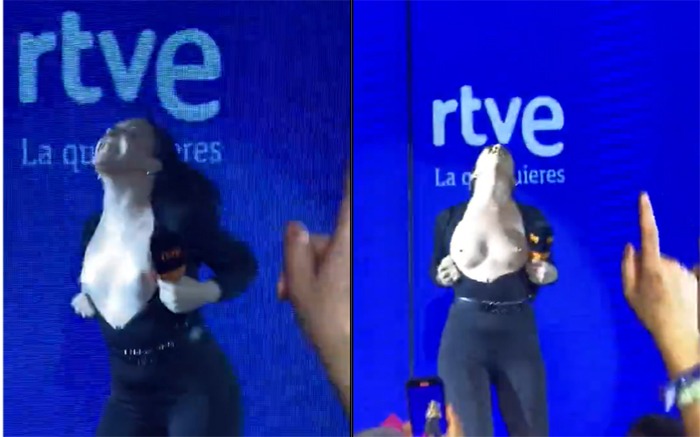The Benidorm Fest grand finale was supposed to be all about music and Spain’s Eurovision selection. However, it quickly became the center of controversy—not just because of Melody’s victory with Esa Diva but also due to a viral moment involving Ines Hernand, one of the event’s presenters. A video of her onstage performance at a private party following the festival has sparked intense debate across social media.
What is Ines Hernand Benidorm Fest Viral Video?

During an afterparty for the Benidorm Fest, Ines Hernand took to the stage to perform Ay Mamá by Rigoberta Bandini, a song known for its strong feminist message. As she sang the lyrics—particularly the line “I don’t know why our tits are so scary”—she unzipped her top and briefly exposed her breasts, a gesture that immediately drew attention.
The moment, which was captured on video, quickly spread across platforms like Twitter (X), Instagram, and TikTok, generating thousands of reactions. What made it even more controversial was the setting—logos of RTVE (Spanish public broadcaster) and the Generalitat Valenciana were visible on the event’s screen, leading to speculation about whether the incident happened at an official party.
Social Media Uproar and Public Reaction

As expected, the video of Ines Hernand went viral, drawing mixed reactions from the public. Many social media users criticized her action, calling it unnecessary and attention-seeking, while others mocked her physical appearance. One Twitter user commented:
“Someone needs to tell Inés Hernand that exposing her breasts in Spain today isn’t rebellious at all. It’s honestly embarrassing.”
Others, however, came to her defense, arguing that her gesture aligned with the feminist message of the song. Ay Mamá by Rigoberta Bandini was originally written to challenge societal norms around women’s bodies, so Hernand’s action was seen by some as a powerful expression of body autonomy.
Inés Hernand’s Response to the Backlash

Amidst the growing controversy, Inés Hernand addressed the issue directly on her X (formerly Twitter) account. She defended herself, shifting the focus to how people perceive such acts rather than the act itself. She wrote:
“I don’t know why our breasts (and our words, our freedom, and our existence…) are so terrifying. If I’m at a private party, the perversion and the problem lie in the eye of the beholder, not in the person expressing themselves. Kisses.”
Her response aimed to highlight the double standards in society—where women’s bodies are often over-sexualized while men rarely face similar scrutiny.
Political Figures and Celebrities Weigh In
The controversy escalated further when Spanish politician Irene Montero came forward to defend Inés Hernand. Montero, known for her strong feminist stance, criticized the backlash against the presenter.
In a video posted on X, Montero stated:
“So much talk about freedom, but Inés Hernand shows her breasts, and people spend three days crying about it. Freedom doesn’t mean only doing things that don’t bother others—it’s about having control over our own bodies.”
Her comment resonated with many feminists, reinforcing the idea that a woman’s body should not be a subject of public debate or criticism.
The Bigger Debate: Feminism, Body Autonomy, and Social Standards
The Inés Hernand Benidorm Fest viral video has reignited discussions about feminism, body positivity, and censorship. Some key points of debate include:
- Is nudity still considered rebellious in today’s society? – While some argue that acts like Hernand’s are outdated and no longer shocking, others believe they remain important symbols of body liberation.
- Should private moments be scrutinized online? – The viral nature of the video raises concerns about privacy, consent, and the ethics of sharing such content without permission.
- Double standards in public perception – Many have pointed out that when male celebrities engage in provocative behavior, the response is often much more forgiving.
Conclusion
The viral video of Inés Hernand at Benidorm Fest has become more than just a moment of controversy—it has sparked a larger conversation about body autonomy, feminism, and media ethics. While some view her act as empowering, others criticize it as unnecessary and performative.
Regardless of where one stands on the issue, the incident has highlighted the ongoing debate about societal norms, personal freedom, and gender equality. One thing is certain—Inés Hernand’s moment on stage won’t be forgotten anytime soon.
